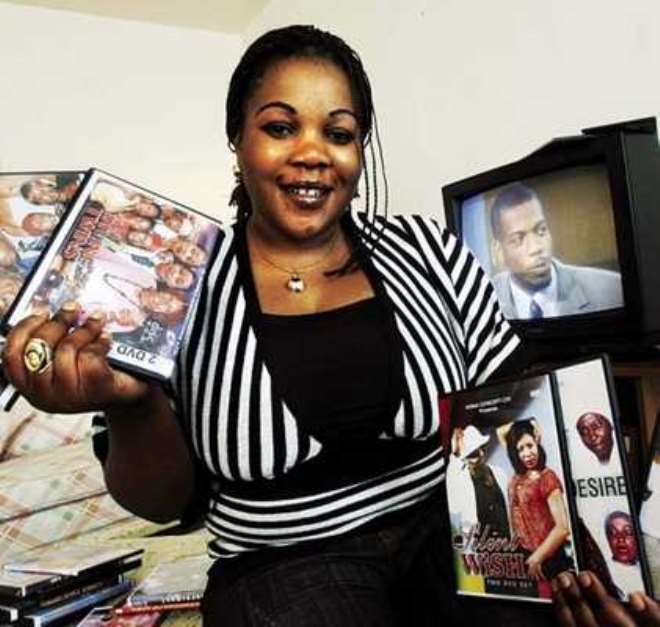AFRICAN IMMIGRANTS FIND CONNECTION IN 'NOLLYWOOD' FILMS
Brad Pitt and Angelina Jolie may seem like the ultimate when it comes to mega movie stars. But in Mado Walelo's world, Pitt and Jolie barely exist. Instead, they are replaced by Ramsey Nouah and Genevieve Nnaji.
For Walelo, and other African immigrants in Buffalo and around the United States, Hollywood stars are easily overlooked for those of Nollywood – Nigeria's thriving movie industry.
Nollywood is the world's thirdlargest movie industry, behind the United States and India's Bollywood. Nigeria, Africa's most populous nation, is rapidly producing low-budget, straight-to-DVD English language movies with varied story lines that deeply resonate with Africans all over the world.
In Buffalo, as the African immigrant population grows, these movies are becoming extremely popular.
“I'm into Nigerian movies more than the American movies,” said Florence Harry, a 28-year-old Nigerian native who lives in South Buffalo. “American movies are more artificial. Nigerian movies are based on true stories, and you learn a lot from Nigerian movies.”
Harry is obviously not alone with that opinion. Industry analysts estimate Nigerian movie sales at $286 million last year. This compares with Indian films, which grossed $2 billion, and American movies, which earned $9.49 billion last year.
The films are purchased all over the world on the Internet. Locally, they can be bought at some internationally themed stores.
Kola Olugbemi, a 39-year-old Nigerian who runs Africanmovies.com., said the company buys the rights of the various titles and then ships 50,000 to 100,000 DVDs a month to African movie lovers in the United States, Europe and Asia. But the majority of his orders come from the Caribbean.
“Jamaicans in Buffalo and all over like these movies,” said Dionne James, 20, whose family owns Palm Tree. “I watch them almost every day when I have time. They are more realistic and emotional.”
Growing demand
Manuel Moxi, owner of the God is Love International Market in two Buffalo locations, said that although his businesses are mostly food stores, many of his customers asked him to carry African movies.
“People kept asking me; they really wanted the movies,” said Moxi, a native of Angola. He orders the DVDs from a distributor in Kentucky and sells them two for $15 or $7.50 each. In a week's time, he said, about two dozen are sold to local African and Caribbean natives.
Palm Tree Caribbean Restaurant on Allen Street also has DVDs for sale.
Local African movie fans mostly get their DVDs from friends and family living in larger cities or back in Africa, many of them said. Harry's husband in Nigeria mails her movies or she buys them from friends who traveled to New York City for the latest releases. She owns more than 100 movies and often lends them to others.
James goes to New York City every two weeks to bring back new DVDs to watch. She said the movies' scenery reminds her of her island home. “The villages look a lot like the countryside of Jamaica,” she said.
Nollywood took off in 1992, with the blockbuster movie “Living in Bondage,” a morality tale, which sold 500,000 copies in a week. Despite what is often described as poor production, the industry has thrived since then.
The movies span all genres, often with a melodramatic approach, spotlighting different facets of African life — from love to religion. With strong themes of deception, betrayal and jealousy, some of the movies are reminiscent of American soap operas. But many fans find the moral lessons, which seem to be an integral part of a lot of the plot lines, to be most appealing. Also, the downtrodden often overcome their obstacles in many of the movies, which viewers say they like to see.
“The African movies educate about different behaviors under different circumstances,” said Suliman Sharriff, a Liberian native. “They are so interesting — they take things that happen normally and put them into action to show us.”
Reminders of home
African movies have traditionally been made and financed by European or American sources for arthouse audiences in the West. Nigerian movies changed that. The films are totally Nigerian productions — from the financing, acting, writing to directing — made with an African audience in mind.
“People find that they can relate to the characters and situations in these movies,” said Olugbemi. “When those who are away from home watch these movies, they remind them of home.”
And for that reason these DVDs are a popular source of entertainment for the city's growing African refugee community.
Tai Balofin, a Nollywood producer/director who has made 11 films in 20 years, said the industry's marketing formula has remained simple: “It's independent producers working with independent distributors, so this way they can reach out to different outlets.”
Compared to the U.S. and India, production costs and time are reduced greatly in Nigeria. “You can knock out a movie in two weeks, sometimes a week and half,” he said.
Balofin, whose next film “Blue Sky” will be release early next year, also writes his scripts and stars in his movies, to further lower expenses. Films on average cost between $15,000 to $30,000.
“I like the Nigerian movies because they teach you different lessons,” said Walelo, a 26-year-old Congolese, who now lives on the East Side. “I watch them a lot.”
“A lot” is almost an understatement. An African movie plays almost every weeknight before Walelo turns in. On the weekends, Walelo's sister visits to indulge in a marathon of movies.
Her face lights up with excitement as she tries in vain to pick the best out of a collection of 30 or so DVDs. “I have so many favorites,” she said.
Latest News
-
 Actress Biodun Okeowo Celebrates Lege Miami On His
Actress Biodun Okeowo Celebrates Lege Miami On His -
 Davido's 'With You' Ft Omah Lay Official Video Hi
Davido's 'With You' Ft Omah Lay Official Video Hi -
 "I'm Ready For My Next Husband" - Ka3na Reveals
"I'm Ready For My Next Husband" - Ka3na Reveals -
 "I Humbly Suggest You Bring Back The Cashless Poli
"I Humbly Suggest You Bring Back The Cashless Poli -
 Yul Reacts To Photo Of New Born Daughter Being Use
Yul Reacts To Photo Of New Born Daughter Being Use -
 Burna Boy Reveals That He Is Considering Having Ki
Burna Boy Reveals That He Is Considering Having Ki -
 "Nollywood's Growth Requires Sacrifices From Curre
"Nollywood's Growth Requires Sacrifices From Curre -
 "Everyday With You Is A Blessing" - D'banj Celebra
"Everyday With You Is A Blessing" - D'banj Celebra -
 Nkechi Blessing Flaunts New Man On Social Media, D
Nkechi Blessing Flaunts New Man On Social Media, D -
 Yhemolee Celebrates Son As He Clocks Six Months
Yhemolee Celebrates Son As He Clocks Six Months














